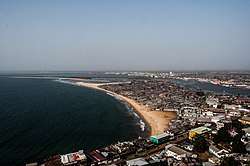West Point, Monrovia
West Point is a township of the Liberian capital city of Monrovia, located on a 0.53 km2 peninsula which juts out into the Atlantic Ocean between the Mesurado and Saint Paul rivers. West Point is one of Monrovia's most densely populated slums.
West Point | |
|---|---|
 | |
| Country | Liberia |
| County | Montserrado |
| District | Greater Monrovia |
| Government | |
| • Commissioner | William C. Wea |
| Area | |
| • Total | 0.53 km2 (0.20 sq mi) |
| Population (2014)[2] | |
| • Total | 34,605 |
| • Density | 65,000/km2 (170,000/sq mi) |
Environmental degradation has gradually caused part of the peninsula to erode into the ocean. Endemic problems include overpopulation and diseases such as tuberculosis.[3]
History
The settlement formed in the 1940s.[4] An experiment in the 1970s to move people from West Point failed.[5] Residents returned despite squalid living conditions.[5] People moved back to fish and make a living as informal shopkeepers and service providers close to the city centre.[5]
During the 2014 Ebola outbreak, the neighborhood was placed under quarantine, such that nobody could enter or leave, a practice known as Cordon sanitaire. This drew criticism from health experts and human rights advocates.[6][7] The quarantine was halted after 10 days, and President Ellen Johnson Sirleaf later acknowledged that this decision had been a mistake.[8]
Government
In 2018 President George Weah appointed William C. Wea as Commissioner for West Point.[9]
West Point is part of the Montserrado-7 electoral district.[10]
Demographics
West Point (or Zone Z400) is divided into six communities;
| Community | Inhabitants (2014 est.) | No. of Households (2014 est.) |
|---|---|---|
| Central West Point | 7,959 | 1,941 |
| Fish Town | 6,094 | 1,486 |
| Grandcess Yard | 7,341 | 1,790 |
| Police Station | 4,911 | 1,198 |
| Power Plant | 4,651 | 1,134 |
| West Point | 3,649 | 890 |
| Total: | 34,605 | 8,439 |
Social issues
Sanitation
The area lacks proper sanitation and public toilets.[11][12] and a 2009 report by United Nations Office for the Coordination of Humanitarian Affairs estimated that there were four public toilets in the area.[13] Pay toilets exist, but residents cannot afford them, and thus public defecation is common.[13] The beach surrounding West Point is often used as a lavatory which creates health hazards as the water is used for drinking and fish from the water are consumed.[11][13]
See also
General:
- Slums in Africa
References
- JICA. THE MASTER PLAN STUDY ON URBAN FACILITIES RESTORATION AND IMPROVEMENT IN MONROVIA IN THE REPUBLIC OF LIBERIA
- Liberia Institute of Statistics and Geo-Information Services. Population 2008, 2014 by County, District, Clan and Households, Liberia
- "West Point, Liberia: An environmental menace". The Liberian Dialogue. February 24, 2007.
- "Fearing the Tide in West Point, a Slum Already Swamped With Worry", New York Times, March 15, 2016
- "LIBERIA: Disease rife as more people squeeze into fewer toilets", IRIN News, 19 November 2009.
- Onishi, Norimitsu (2014-08-28). "As Ebola Grips Liberia's Capital, a Quarantine Sows Social Chaos". The New York Times. ISSN 0362-4331. Retrieved 2020-01-25.
- "Liberia's West Point Slum Reels From the Nightmare of Ebola". Time. Retrieved 2020-01-25.
- MacDougall, Clair (2015-05-12). "Liberia's Military Tries to Remedy Tension Over Ebola Quarantine". The New York Times. ISSN 0362-4331. Retrieved 2020-01-25.
- Executive Mansion. President Weah Makes further Appointments in Government
- National Electoral Commission. Montserrado County Electoral District No.7 2017
- KIEH, GEORGE KLAY (2008). FIRST LIBERIAN CIVIL WAR : THE CRISES OF UNDERDEVELOPMENT. Peter Lang. p. 118. ISBN 978-0-8204-8839-4. Retrieved 30 March 2013.
- Patton, Carl V. (1988). Spontaneous Shelter: International Perspectives and Prospects. Temple University Press. p. 227. ISBN 978-0-87722-507-2. Retrieved 30 March 2013.
- Africa water atlas. UNEP/Earthprint. 2010. p. 255. ISBN 978-92-807-3110-1. Retrieved 30 March 2013.
External links
- "LIBERIA: Disease rife as more people squeeze into fewer toilets". IRIN News. 19 November 2009.